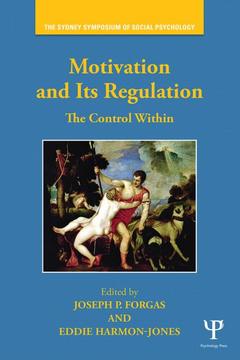Motivation and Its Regulation The Control Within Sydney Symposium of Social Psychology Series
Coordonnateurs : Forgas Joseph P., Harmon-Jones Eddie

It is motivation that drives all our daily endeavors, and it is motivation, or the lack of it, that accounts for most of our successes and failures. Motivation, however, needs to be carefully controlled and regulated to be effective.
This book surveys the most recent psychological research on how motivational processes are regulated in daily life to achieve desired outcomes. Contributors are all leading international investigators, and they explore such exciting questions as: What is the relationship between motivation and self-control? What is the role of affect and cognition in regulating motivation? How do conscious and unconscious motivational processes interact? What role do physiological processes play in controlling motivation? How can we regulate aggressive impulses? How do affective states control motivation? Can motivation distort perception and attention? What are the social, cultural and interpersonal effects of motivational control?
Understanding human motivation is not only of theoretical interest, but is also fundamental to applied fields such as clinical, counseling, educational, organizational, marketing and industrial psychology. The book is also suitable as an advanced textbook in courses in motivational sciences, and is recommended to students, teachers, researchers and applied professionals as well as laypersons interested in the psychology of human motivation and self-control.
Motivation and Its Control: Introduction and Overview, E. Harmon-Jones, J.P. Forgas. Part 1. Introduction and Basic Issues. Beyond Pleasure and Pain: Value from Engagement, E.T. Higgins. The Evolutionary Unconscious: From ‘Selfish Genes’ to ‘Selfish Goals’, J.A. Bargh, J.Y. Huang. Dual Process Models and Serotonergic Functioning: Impulse and Self-Control, C.S. Carver, S.L. Johnson, J. Joormann. Imagination and Behavioral Control. C.N. Macrae, B.M. Christian, L.K. Miles. The Ego Fixation Hypothesis: Involuntary Persistence of Self-Control, S.L. Koole, M. Tops, S. Strübin, J. Bouw, I.K. Schneider, N.B. Jostmann. Part 2. Affective Mechanisms and Affect Control. No Pain, No Gain: How Distress Underlies Effective Self-control (and Unites Diverse Social Psychological Phenomena), M. Inzlicht, L. Legault. The Relationship Between Individual Differences in Executive Functioning and Emotion Regulation: A Comprehensive Review, B.J. Schmeichel, D. Tang. The Regulation of Vision: How Motivation and Emotion Shape What We See, S.B. Most. On the Regulatory Functions of Mood: Affective Influences on Memory, Judgments and Behavior, J.P. Forgas. Psychological and Biological Mechanisms Underlying Control Over Anger and Aggression, T.F. Denson. Part 3. Approach and Avoidance Processes in Social Motivation. The Embodiment of Approach Motivation, E. Harmon-Jones, T.F. Price, C. Harmon-Jones. Avoidance Motivation is Resource Depleting, A.J. Elliot, J. Schüler, M. Roskes, C.K.W. De Dreu. When Saying Yes to the Doughnut Is Not Saying No To Self-control: A Hierarchical Approach to Flexibility in Conflict Representation, A.A. Scholer. Motivated Distance Perception Serves Action Regulation, E. Balcetis, S.Cole.Part 4. Interpersonal, Social and Cultural implications. Sex, Love, Temptation: Human Mating Motives and their Regulation, J.K. Maner, J.Leo. The Natural Order of Things: The Motivated Underpinnings of Naturalistic Explanations for Inequality, J.L. Napier. Cultural Neuroscience of Choice Justification, S. Kitayama, S. Tompson, H.F. Chua. Scaring the Bejesus into People: The Role of Religious Belief in Managing Implicit and Explicit Anxiety, J. Halberstadt, J. Jong. ‘It Is Better to Give Than to Receive’: The Role of Motivation and Self-control in Determining the Consequences of Ostracism for Targets and Sources, L. Zadro, A. Godwin, K. Gonsalkorale.
Joseph P. Forgas is Scientia Professor of Psychology at the University of New South Wales, Sydney. He received his D.Phil. degree from the University of Oxford, and a D.Sc degree also from Oxford. His research investigates affective influences on social cognition, motivation and behavior. He has published 26 books and over 200 journal articles and book chapters. He received the Order of Australia in 2012, as well as the APS’s Distinguished Scientific contribution Award, the Humboldt Research Prize, and is Fellow of the Academy of Social Sciences in Australia, the Association for Psychological Science, Society of Personality and Social Psychology and the Hungarian Academy of Sciences.
Eddie Harmon-Jones is Professor of Psychology at the University of New South Wales, Sydney. His research focuses on emotions and motivations, their implications for social and cognitive processes, and their underlying neural circuits. He has published over 150 articles and book chapters and four books. He received the Award for Distinguished Early Career Contribution to Psychophysiology from the Society for Psychophysiological Research (2002), and the Career Trajectory Award from the Society of Experimental Social Psychology (2012). He is a Fellow of the Association for Psychological Science, the Society for Experimental Social Psychology, and the Society for Personality and Social Psychology.
Date de parution : 05-2014
15.2x22.9 cm
Disponible chez l'éditeur (délai d'approvisionnement : 14 jours).
Prix indicatif 71,13 €
Ajouter au panierThème de Motivation and Its Regulation :
Mots-clés :
ego; depletion; negative; affect; goal; pursuit; system; justifi; cation; approach; Conflict Monitoring Theory; Minnesota Multiphasic Personality Inventory; Animal Kingdom; Reactive Aggressiveness; Vice Versa; Nonreligious Participants; Relationship Maintenance; Relative Left Frontal Activity; Ostracism Episode; Ego Depletion; Event Related Brain Potential; Goal Pursuit; Effortful Control; SYSTEM JUSTIFICATION THEORY; Expressive Suppression; LPP Amplitude; Action Identifi Cation Theory; Unconscious Motivational Processes; Worldview Defense; Death Anxiety; Attractive Relationship Alternatives; Frontal Cortical Activity; Dorsal Anterior Cingulate Cortex; Trait Aggressiveness; Death Anxiety Questionnaire



